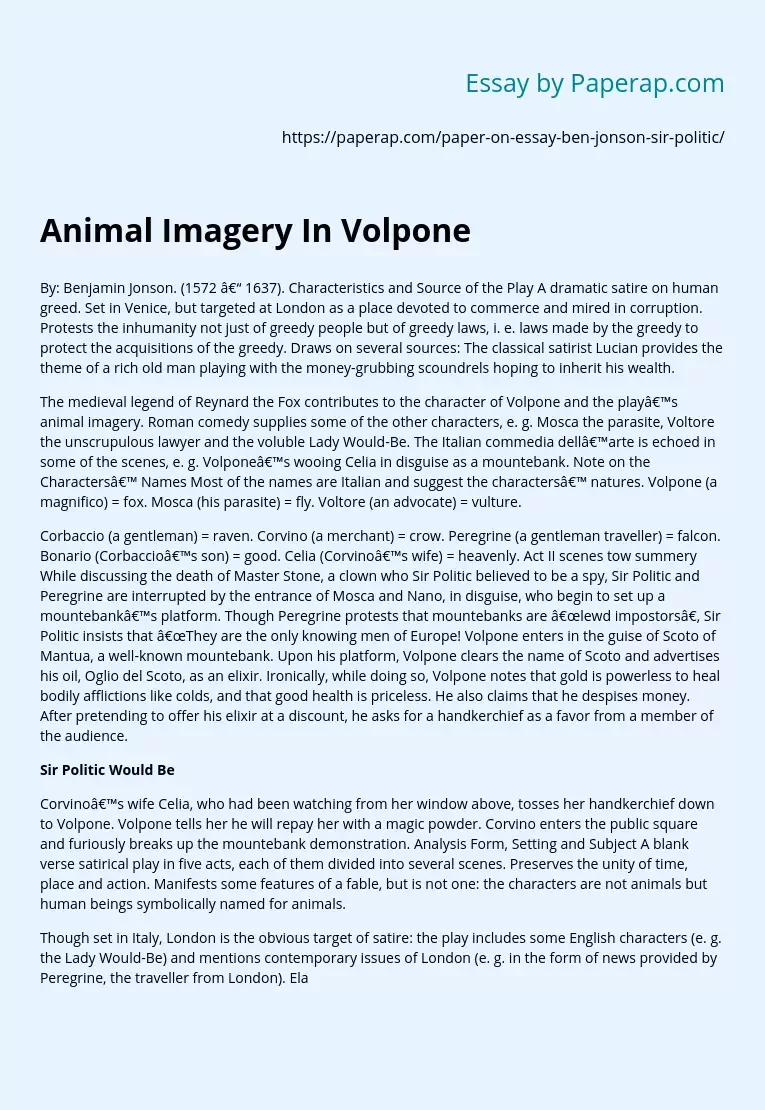Animal Imagery In Volpone
By: Benjamin Jonson. (1572 – 1637). Characteristics and Source of the Play A dramatic satire on human greed. Set in Venice, but targeted at London as a place devoted to commerce and mired in corruption. Protests the inhumanity not just of greedy people but of greedy laws, i. e. laws made by the greedy to protect the acquisitions of the greedy. Draws on several sources: The classical satirist Lucian provides the theme of a rich old man playing with the money-grubbing scoundrels hoping to inherit his wealth.
The medieval legend of Reynard the Fox contributes to the character of Volpone and the play’s animal imagery. Roman comedy supplies some of the other characters, e. g. Mosca the parasite, Voltore the unscrupulous lawyer and the voluble Lady Would-Be. The Italian commedia dell’arte is echoed in some of the scenes, e. g. Volpone’s wooing Celia in disguise as a mountebank. Note on the Characters’ Names Most of the names are Italian and suggest the characters’ natures.
Volpone (a magnifico) = fox. Mosca (his parasite) = fly. Voltore (an advocate) = vulture.
Corbaccio (a gentleman) = raven. Corvino (a merchant) = crow. Peregrine (a gentleman traveller) = falcon. Bonario (Corbaccio’s son) = good. Celia (Corvino’s wife) = heavenly. Act II scenes tow summery While discussing the death of Master Stone, a clown who Sir Politic believed to be a spy, Sir Politic and Peregrine are interrupted by the entrance of Mosca and Nano, in disguise, who begin to set up a mountebank’s platform. Though Peregrine protests that mountebanks are “lewd impostors”, Sir Politic insists that “They are the only knowing men of Europe! Volpone enters in the guise of Scoto of Mantua, a well-known mountebank.
Upon his platform, Volpone clears the name of Scoto and advertises his oil, Oglio del Scoto, as an elixir. Ironically, while doing so, Volpone notes that gold is powerless to heal bodily afflictions like colds, and that good health is priceless. He also claims that he despises money. After pretending to offer his elixir at a discount, he asks for a handkerchief as a favor from a member of the audience.
Sir Politic Would Be
Corvino’s wife Celia, who had been watching from her window above, tosses her handkerchief down to Volpone. Volpone tells her he will repay her with a magic powder. Corvino enters the public square and furiously breaks up the mountebank demonstration. Analysis Form, Setting and Subject A blank verse satirical play in five acts, each of them divided into several scenes. Preserves the unity of time, place and action. Manifests some features of a fable, but is not one: the characters are not animals but human beings symbolically named for animals.
Though set in Italy, London is the obvious target of satire: the play includes some English characters (e. g. the Lady Would-Be) and mentions contemporary issues of London (e. g. in the form of news provided by Peregrine, the traveller from London). Elaborates on the question of how far greedy men can go when they hope for profit: Corvino prostitutes his wife, Voltore accuses two innocent people at the court of justice, Corbaccio disinherits his son etc. Characters
Presents mostly stock characters who are either completely wicked (the set of the beasts of prey including Voltore, Corbaccio and Corvino) or completely innocent (the falsely accused Celia and Bonario). Mosca and Volpone are more ambiguous characters. Volpone cruelly teases the greedy heirs-would-be, which may be seen as a rightful moral lesson on account of their greediness. However, he also gains his wealth by dishonest means, feigns he is about to die to win expensive presents from the hoping inheritors and tries to seduce other man’s wife.
Mosca starts as a rather sympathetic clever character who ingeniously stages his master’s masquerade and does not seem to make claims to Volpone’s wealth. Nevertheless, at the end Mosca turns out to be equally greedy as the others, when he makes use of the situation and gets hold of Volpone’s fortune. Conclusion The concluding victory of justice and punishment of evil is rather inconsistent with the play’s satire. Perhaps the author meant to keep within the genre of comedy with his happy conclusion, or to give expression to his optimistic hope, or to avoid upsetting or annoying the audience.
Animal Imagery In Volpone. (2019, Dec 05). Retrieved from https://paperap.com/paper-on-essay-ben-jonson-sir-politic/

